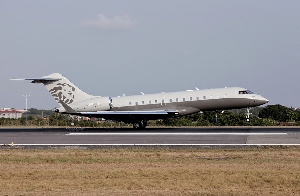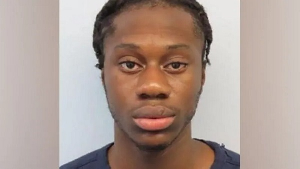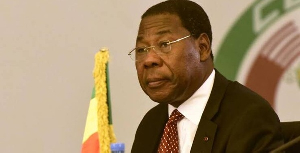Sekondi, August 11, GNA - A witness at Monday's sitting of the National Reconciliation Commission (NRC) at Sekondi told members of how in February, 1982, 24 soldiers used his head as football and kicked him several times at the Cape Coast Regional office for allegedly hoarding beer.
The witness, Reverend Roland Amegbor of the assemblies of God Church said, when the commanding officer, one Squadron Leader Lamptey came on the scene, they quickly stopped when one of them shouted "CO, CO". However, when the Commanding Officer was told of the offence of Rev. Amegbor, he retorted, "why didn't you kill him to serve as a lesson to the people of Cape Coast".
He told the Commission that, during that time he was acting as the manager of the Cape Coast Parliament Hotel because the then manager, one Mr. Thompson had been taken ill.
On the day in question, Rev. Amegbor said he closed the hotel to the public to enable the workers to tidy up the premises as a routine exercise and a notice board placed at the entrance of the hotel to inform visitors.
He said at about 9 pm that day, four armed soldiers entered the hotel and asked him why he refused to sell beer to earlier in the day, he explained that there was a cleanup at the hotel and he was bundled into a taxi and taken to the house of the manager. The two were taken to the Regional office where the torture began, Rev. Amegbor told the Commission.
After sometime, they were asked to mention their names and when he did, one of the soldiers demanded from him why he, being a citizen of the Volta Region should disgrace the people of the region and he ordered that he should be punished more for that.
When they were released, Rev. Amegbor said he left to his village and about a month later heard the death of Mr. Thompson whose body was seen floating in the sea.
He was said to have committed suicide.
Rev. Amegbor said for the first four years after the incident, he experienced severe headache.
He told the Commission that he had forgiven those who took part in the torture but said he always remembered the brutalities meted out to him for doing no wrong when he sees scars in his face anytime he looks into the mirror.
He called on Ghanaians to jealously guide and protect the constitutions and the democratic dispensation, "so that we don't go back to the era of the animal kingdom", and said as a man of God he was not expecting any compensation for the ordeal he went through.
At that juncture, The Most Rev. Bishop Palmer-Buckle, a member of the Commission spoke about the dangers of tribal sentiments in the society and advised that, everything must be done to do away with the tendency to make the country a happy one for all.
Nana Intsiful Asare II, who was the chief of Bonsa, also told the Commission of how in 1983, his 14- year-old daughter was hit in the ribs with the butt of a gun by one of four soldiers who had come to arrest him for trying to settle a land dispute between two of his subjects.
The girl died at the Effia-Nkwanta hospital the following day. Nana Asare said, in order to arrive at a fair decision in the dispute, he asked Obeng Yaw, one of those involved in the dispute to submit documents on the land under litigation but instead he went to bring armed soldiers to arrest him.
It was during his arrest that his daughter was hit with the butt of the gun.
He said, he was taken to the Apremdo barracks, and after interrogation by a Sergeant Bawa he was released.
Madam Akuba Eduku narrated how her husband, a security officer in the first republic was detained at the Usher Fort and Nsawam prisons for two years after the overthrow of the regime of Dr. Kwame Nkrumah in 1966. Her husband, Mr. Kofi Yankey was on the president's entourage to Hanoi when the incident happened but he decided to come home only to be arrested and detained.
All their property got lost, Madam Eduku said.
Mr. Mark Anthony Koomson, a police officer stationed at Kumasi Zongo told the Commission that he was jailed three years in 1979 by the AFRC special court for allegedly taking bribe, a charge he denied. He said he was invited to tell the court about the alleged bribe in a murder case that his superior officer, one Chief Inspector Hamound was handling and when he denied knowledge he was asked to go only to see his name in a national daily, five months later that he had been tried and jailed for the offence
Three soldiers and two policemen arrested him and sent him to the Nsawam prisons, Mr. Koomson, now unemployed said, adding that, he was not maltreated.
Mr. Emmanuel Akrofi a farmer resident in Accra said soldiers shot him in 1981, when he visited his wife at her home in Takoradi.
He said he came from Daboase to visit his wife who was living near the former Cape Coast-Mankessim lorry station in Takoradi when he learnt that a soldier had been killed and was lying at the station.
Mr. Akrofi said the entire neighbourhood became frightened and remained indoors until 9:00am the following morning but just then, soldiers started shooting and ordered every tenant within the area to come out of their rooms.
He said the firing continued and as the soldiers came closer to his room he came out and was followed by his wife and 15- year- old daughter but just then, they shot him in his right elbow. Mr. Akrofi said he fell down instantly and pretended to be dead but managed to go to the hospital as soon as the soldiers left. He said the angry soldiers killed Tamakloe and Kofi Frafra who were co-tenants.
Major Dominus E. K. Edjameh (RTD), said he joined the army in 1963 and was in the Recce regiment when the June 4 1979 coup took place. He said at 1:00 am he heard gunshots and did not know what was happening but when he went to the guardroom to handover the following day, he saw a large number of people in the guardroom.
He said, just as he left the guardroom, he was shot in the chest and collapsed but recovered at the 37 military hospitals, where he had undergone surgery to remove the bullet, which was between his heart and the rib cage.
Major Edjamah told the Commission that he lost three ribs, while part of his heart was destroyed due to the effects of the bullet. He said in 1983, the Workers Defence Committee (WDC) accused him of stealing a Bedford engine and a Special Investigation Board instituted, put him under house arrest but was acquitted for lack of evidence.
Major Edjameh said he was discharged from the Army in March 1984 without any benefits but in 1998, the Armed forces, paid him 91,000 cedis through his bankers. He said he petitioned the Commission on Human Rights and Administrative Justice (CHRAJ) but to no avail and in December 2000, the Armed Forces informed him of his release and paid his salary and pension from March 25, 1984 to January 12, 1992.
Mr. Moses Kainyah-Erzuah, now a farmer at Agona Nkwanta was formerly a security officer at the Flagstaff house.
He said one day around 12 midnight in 1966, he heard gunshots and when he investigated, he realized that a coup had taken place. Mr. Kainyah-Erzuah said he quickly took his wife and children to the State Transport Corporation (STC) yard and dispatched them to Agona Nkwanta.
He said when he tried to get back home, he realized that soldiers had surrounded their house, he therefore, left for Kumasi where his senior brother was.
Mr. Kainyah-Erzuah said his brother, who was then working in Kumasi, had also been detained so he left and settled at Agona Nkwanta where he began a coconut plantation.
Mr. Salifu Nombre, a former warden at the Takoradi Airforce station, told the Commission that his son, Seidu Nombre was shot and killed at Kokompe light industrial area barely three days after returning home from overseas.
He said his son decided to visit his friends at the Kokompe when soldiers, surrounded the place and arrested all the young men. Mr. Nombre said they were beaten, drilled and asked to drink water from a nearby drain and when Seidu refused, he was shot in the forehead. Mr. Thomas Amoah a farmer resident at Awudua near Tarkwa recounted how his brother, Joseph Quantson and uncle, Peter Boafo were killed by soldiers at the Mfantsi Mines at the Goldfields Mining area. He mentioned the names of Killer, Nyantakyie and Sherrif as the perpetrators of the crime.
Mr. Amoah said his uncle, who was the secretary of the local distillery association, was arrested by the soldiers for allegedly selling above the approved price.
Mr. Amoah said, while Boafo was being escorted to the Police Station, he met Quantson, who had closed from work at the Ghana Manganese Company (GMC) and gave him his keys.
Mr. Amoah said Quantson therefore, rushed into Boafo's and collected all the provisions but just when he was about to throw them away, he was arrested by members of the People's Defence Committee (PDC) and handed over to the soldiers.
He told the Commission that members of his family were severely beaten before they were executed and dumped into the abandoned mine. Mr. Amoah said Boafo's mother died two weeks later while his wife also died a year later from shock.
General News of Tuesday, 12 August 2003
Source: GNA












